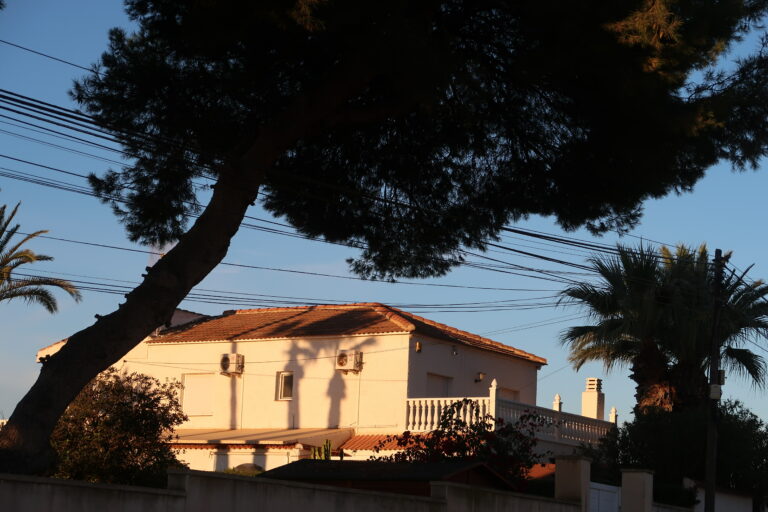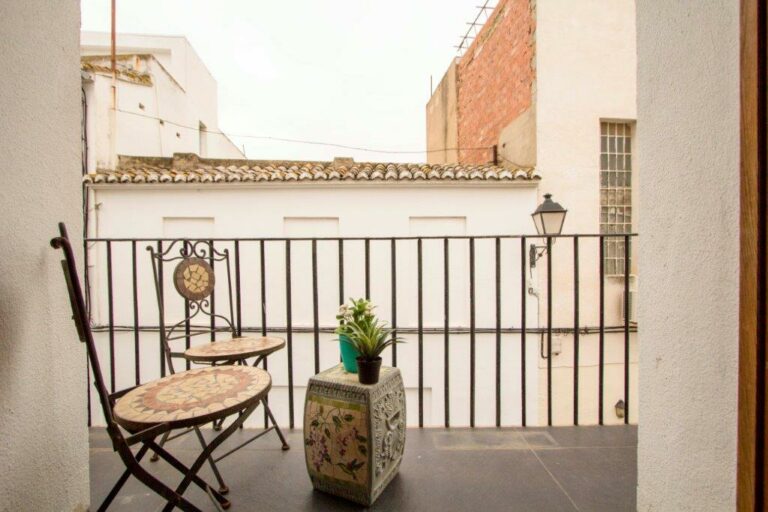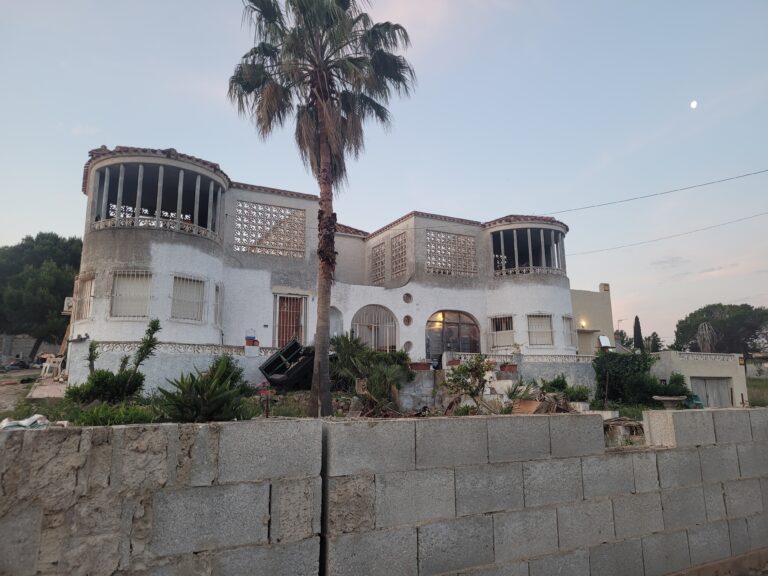Kenen puolella välittäjä on?
Talo on myynnissä usealla välittäjällä, kymmenkunta asunnon välittäjää ja kaikilla eri hinta ja neliömäärä. Omistaja itse myy alhaisimmalla hinnalla ja korkeimmalla neliömäärällä. On koomista, kun eri välittäjät ilmoittavat omia hinnan alennuksia, kun markkinoilla samaa taloa myydään muualla paljon edullisempaan hintaan. Talosta on otettu paljon kuvia eri kuvakulmista, eri puolelta taloa. Ostajalla voi olla haasteellista käsittää, että kyseessä sama talo.
Useampi välittäjä
Espanjassa kiinteistö voi olla useammalla välittäjällä. Tämän vuoksi jotkut tiedot saattavat vaihdella, mitä mielestäni ei pitäisi. Myyjän on aina tarkistettavat oman kiinteistönsä tiedot! Jos välityspalkkiot ovat noin 5%+vat, niin sillä palkkiolla pitäisi tehdä parempaa työtä. Neliömääriä voi oikaista, mutta ei koskaan hintoja alaspäin. Se myyntihinta, minkä laitat nettiin, niin se ei koskaan katoa, joten jos hinta on ollut alusta lähtien liian alhainen ja haluat nostaa sitä, niin se ei onnistu ilman, että se näkyy netissä. Vanhat tiedot säilyvät. Tiedän tapauksia, joissa myyjä on alunperin laittanut liian alhaisen hinnan, katunut sitä ja halunnut nostaa myyntihintaa. Kyllä ostajat löytävät myynti-ilmoitukset netistä. Jos myyjä ei halua alentaa hintaa, mutta on valmis neuvottelemaan hinnasta potentiaalisen ostajan kanssa, niin tuntuu usein, että välittäjät ovat hieman ymmällään ja haluavat virallisesti vain laskea hintaa. Eikö hinnasta neuvotteleminen ole tärkeä osa kaupantekoa? Välittäjän osaaminen tulisi hyvin esille, varsinkin jos on taitava neuvottelemaan. Ovatko kiinteistövälittäjät taksikuskeja? Usein tuntuu siltä. Myyminen on taitolaji, mutta tämän lajin osaajia on vaikea löytää.
Varausmaksu
Varausmaksu tarkoittaa Espanjassa sitä, että potentiaaliset ostajat maksavat muutaman tonnin varausmaksun kiinteistövälitysfirman tilille. Tämän jälkeen kiinteistö pitäisi ottaa pois myynnistä. Kaikki firmat eivät näin toimi ja kiinteistö on voinut jäädä roikkumaan nettiin vielä vuosi sen jälkeen kun se on myyty. On tullut vastaan tilanteita, jossa ostaja haluaisi nähdä kiinteistön, mutta välittäjä ilmoittaa, että nyt ei sovi. Lopulta käy ilmi, että kiinteistö myyty jo aikoja sitten. Miksi ei välittäjä sano suoraan, että heidän moku, koska myynti-ilmoitus edelleen netissä? Ai, niin, espanjalainen ei koskaan myönnä virheitä.
Arras
Varausmaksun jälkeen tehdään arras-sopimus ja ostajat maksavat 10% kauppahinnasta noin 7 vuorokauden päästä tai miten sitten sovitaan. Tämän aikana myyjät eivät voi tehdä muuta kuin odottaa. Jos ostaja ei haluakaan ostaa kiinteistöä, eikä siis tehdä arras-sopimusta, niin potentiaalinen ostaja saa takaisin ne muutamat tuhannet eurot ja myyjälle ilmoitetaan, että no deals! Henkilökohtaisesti en pidä tälläisestä alustavasta varausmenettelystä, koska myyjää kohtaa erittäin epäreilu. Ostajat voivat maksella varausmaksun huoletta, koska saavat kaikki varausmaksurahat takaisin, jos eivät tee kauppoja. Samanaikaisesti kiinteistö on poissa myynnistä, eikä tarjouksia voida ottaa vastaan. Varsinkin, jos myyjillä on kiire myydä kiinteistönsä, niin tälläinen odottaminen on epäreilua. Toiseksi, koska useampi kiinteistövälitysfirma myy samaa kiinteistöä, niin kaikkien pitäisi poistaa kohde ja taas palauttaa markkinoille, jos ei tule kauppoja. Kun ja jos myyn oman kiinteistöni, niin en suostu varaukseen, vaan suoraan arras-sopimus. Otan mielelläni tarjouksia vastaan, kunnes korkein tarjous hyväksytään.
Ostajalle kumarretaan
Aikoinaan ihmettelin sitä kuinka välittäjä selvästi oli aina ostajan puolella. Eikö myyjä maksa välittäjän palkkion? Kyllä maksaa palkkion, mutta ennen sitä on saatava ostaja kiinteistölle, joten tämän vuoksi ostaja on se, jolle kumarretaan. Tämä pitää paikkansa niin Suomessa kuin Espanjassakin. Ole siis myyjänä tarkkana mitä välittäjä sanoo ja viestittelee, sillä välittäjä haluaa tehdä kaupat, jotta saa palkkionsa….. tavalla tai toisella. Ehkä olen nykyään liiankin epäileväinen kaikkea sitä kohtaan mitä välittäjä sanoo. Asennoidun skeptisesti ja mietin, että mikä tämänkin takana on. Varsinkin kun espanjalainen välittäjä alkaa selittelemään, niin huolestun.
Lainaa ei voi siirtää
Päinvastoin kuin Suomessa, niin Espanjassa lainaa ei voi siirtää toiseen kiinteistöön. Asuntolaina on aina kiinteistö kohtainen. Aina maksettava vanha laina pois ja otettava uusi laina, jos ostat uuden asunnon. Samoin päinvastoin kuin kotimaassa, niin lainan ottaa aina aviopari yhdessä. Ei onnistu, että jompikumpi ottaa. Tätä on vaikea ymmärtää. Eräs aviopari totesikin, että pitää vaan erota, ottaa laina ja mennä uudestaan naimisiin. Erotessa on tärkeätä tehdä erillinen paperi, jos yhteinen laina jää toisen maksettavaksi, ettei jää maksuvelvolliseksi. Vaikka toinen osapuoli ottaa itselleen entisen yhteisen asunnon ja koko lainan vastatakseen, niin lainanhoidon vaikeutuessa, pankki voi ottaa yhteyttä myös toiseen osapuoleen, entiseen omistajaan.
Tee testamentti myös Espanjassa
Tärkeätä on tehdä Espanjassa testamentti, jossa käy ilmi, että noudatetaan Suomen lakia. Tällä vältetään kahden eri maan erilaisten käytäntöjen toteutuminen. Perilliset kiittävät, ettei tarvitse hoitaa perintöasioita Espanjassa. Suomessakin ihan riitävän raskasta, useimmiten. Kuuntelen usein Ivan Puopolon podcasteja ja pari päivää sitten käsiteltiin perinnön saamista Suomessa. Jos perit mummon mökin, jolla ei käytännössä mitään arvoa, mutta silti verottaja haluaa mätkäistä perintöveron, niin sinun on mahdollista kieltäytyä perinnöstä, jolloin jälkeläiset saavat sen kontolleen, jos niitä on. Jos ei ole perillisiä, niin perintö menee valtiolle. Perillisten pitää vuorostaan kieltäytyä perinnöstä. Kun näin toimitaan, niin ei riitä ettei ota vastaan mummon mökkiä, vaan koko perintö menee valtiolle. Et voi valita mitä haluat pitää ja mitä et. Näin mummon mökkejä tuntuu olevan runsaasti, ihan hienoilla paikoilla ränsistymässä.







